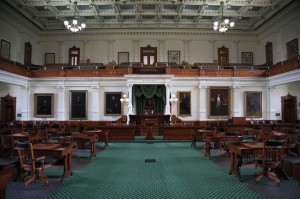Freedom to Discriminate: How “Religious Liberty” Bills Hurt Us All
 The Texas State Senate Chamber
The Texas State Senate Chamber Last week, humanists were outraged when Indiana Governor Mike Pence signed a bill that would, among other things, allow businesses to deny service to same-sex couples looking to get married. Hopefully, pressure from numerous large companies to boycott the state as a result of the legislation will encourage government officials to repeal the new law, but the governor has indicated such a reversal is unlikely.
Indiana is not the only state, however, to grant special religious privileges to those looking to discriminate against customers or employees. Currently, nineteen other states have enacted their own versions of the Religious Freedom Restoration Act (RFRA) that are almost identical to the federal legislation of the same name. Nominally, these statutes are meant to ensure that the government does not interfere with religious traditions, but in practice, these laws all too often let religious individuals burden others with their personal beliefs and morality. For instance, Georgia’s state senate has passed a religious liberty bill that is so broadly written that it could allow employers, under the guise of religion, to fire female employees who have had abortions as well as deny service to LGBTQ individuals and African-Americans. The Arkansas state house and senate have both passed a religious freedom bill that Governor Asa Hutchinson seems poised to sign, even though the legislation could permit discrimination against the LGBTQ community. As marriage equality is becoming legalized in more and more states, those who would like to continue to see LGBTQ individuals restricted to second-class citizenship are cloaking their prejudice in religious liberty legislation.
This religious privileging could also negatively impact humanists and nontheists, and some people who have been attempting to restrict the right of same-sex couples to marry are not shy about expressing their contempt for those who lack a belief in a god. Earlier this month, the Oklahoma state legislature passed a measure that would block marriage licenses in the state, leaving clergy as couples’ only option for officiating marriages. The legislation is meant to attack marriage equality for same-sex couples, but State Representative Todd Russ, who authored the bill, has also indicated disdain for atheists’ marriages. He has been quoted as saying, “They [atheists] don’t have a spiritual basis for marriage and don’t want to have a clergy member or a priest or someone involved in the spiritual aspect, then they can file an affidavit of common-law marriage.” Clearly, Rep. Russ and those who share his views see atheists’ and humanists’ marriages as less than the marriages of religious individuals, and by extension, they seem to view humanists and atheists themselves as second-class citizens.
Despite their rhetoric meant to sound as though they are extending liberty, the religious freedom bills popping up in states across the country actually do the opposite. They restrict the liberty of same-sex couples who wish to partake of the same services offered to opposite-sex couples. They also allow businesses to discriminate against other marginalized groups, such as women, people of color, and atheists and humanists. Instead of ensuring that the government remains religiously neutral, these bills actually grant certain fundamentalist religious groups special privileges and allow them to hide their prejudices behind masks of “liberty” and “freedom.” It’s up to humanists to be vocal about the true intentions of these bills and to unmask their proponents as advocates of discrimination, not freedom.
